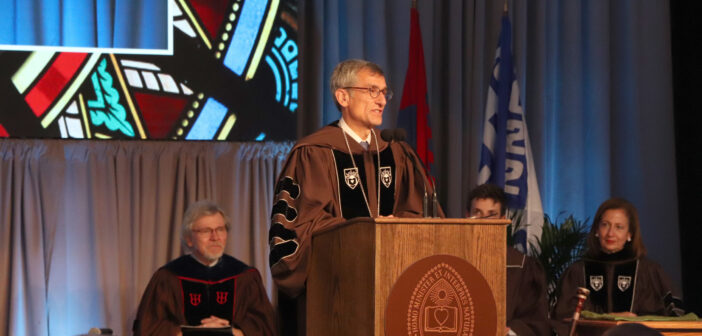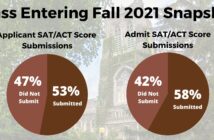Historically, Ph.D. programs have been structured in a way to prepare their candidates to pursue careers in academia, but that is no longer the path most Ph.D. students take, President Joseph Helble, ‘82, said. He said this trend is occurring both nationally and at Lehigh.
“If the majority of our students who engage in original research and go down this path of study are not pursuing academic careers, why does everyone have Ph.D. programs that are structured in such a way that they support development of an academic career to the exclusion of all other pathways?” Helble said.
Over the course of this academic year, he said he will be having conversations about the specifics of how to re-envision the Ph.D. program to better prepare students for a range of post-graduation opportunities.
He said the core element of a Ph.D., being the original scholarly research, will not change. He said the other elements surrounding it, such as the coursework, the seminars, the expectations, the opportunities, possibility to intern, or apply one’s work part way through the program rather than just at the end, are up for discussion.
“I am not dictating a particular direction, but I’m asking for an open and honest assessment with the faculty of what the opportunity is in each of their programs and whether we might be able to do things differently,” Helble said.
In his inauguration speech, he mentioned the recent criticism of higher education across the U.S. in terms of inaccessibility and how it does not provide the skills and resources for jobs after graduation outside of academia. Helble stressed the importance of getting Ph.D. programs to inspire innovators and entrepreneurs.
Michael Burger, associate dean for research and graduate programs, agreed with Helble’s thoughts on Ph.D. programs across higher education.
“I think that the default view of a faculty member when they’re training someone is to train someone to be like themselves,” Burger said. ” And since the faculty are all in academia, that’s what they know best, and so they tend to train upwards.”
Oliver Yao, director of Graduate Student Affairs, explained that many Ph.D. students at Lehigh in the past were able to get jobs outside of academia.
According to data from the past 10 years regarding Lehigh Ph.D. graduates, 41 percent of students have careers in academia, 42.6 percent of them work at non-profit companies and a small percentage work in the public sector, Yao said.
Yao said industry demand for Ph.D. students is growing every year since people need doctoral students to do research.
“We need to provide specific training to our students, so they are ready for industry settings,” Yao said. “The university setting is very different from the industry setting. The university setting is relatively simpler than the industry setting, and we need to train our students if we want them to be successful in the industry setting.”
As a professor in the business school, Yao stressed the importance of incorporating training for industry in the curriculum he teaches and mentioned that MBA students are taught in preparation for industry, so it should be taught to Ph.D. students as well.
Yao also said there is a need for students to learn complex communication skills, research skills, teamwork and networking opportunities.
“Students also need knowledge for specific industries. As a professor, a lot of times, my students conduct basic research that is very industry neutral. If we really want to help students find a job, we need to teach them industry-specific knowledge,” Yao said.
Faculty members involved in Ph.D. programs have already begun to formalize and discuss some of the ways to improve these programs.
Burger has spent time with Yao and other administrators discussing the need for the creation of formalized training plans.
“A lot of our competitors have a formal process for identifying incoming students’ strengths and weaknesses, identifying their career goals, and then mapping out a plan to improve upon the weaknesses,” Burger said. “At the end of their training, they have all the skills that they need to meet their career goals. I think this is a step we can take in a reasonably short time period with a small amount of resource allocation.”
Helble said at his former institution, Dartmouth College, where he was provost, they established a Ph.D. track specifically helping engineers develop skills to be technology entrepreneurs and now the program is university-wide.
He said the National Academies and the Association of American Universities have undertaken studies that look at the Ph.D. or Ph.D. in STEM and whether it needs to change.
“By them asking the question, I think the answer is clearly people think it needs to change,” Helble said. “Let’s be a leader in this space.”






Comment policy
Comments posted to The Brown and White website are reviewed by a moderator before being approved. Incendiary speech or harassing language, including comments targeted at individuals, may be deemed unacceptable and not published. Spam and other soliciting will also be declined.
The Brown and White also reserves the right to not publish entirely anonymous comments.